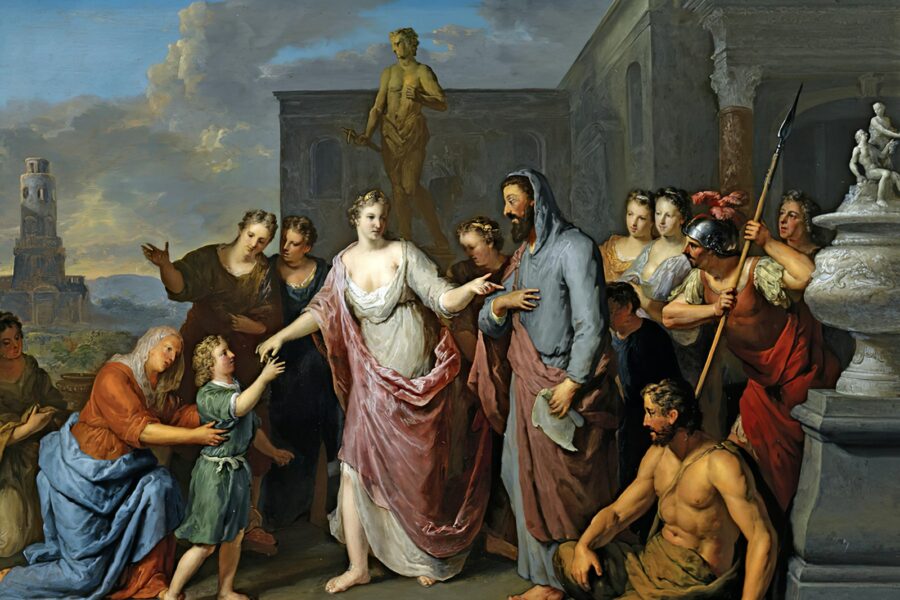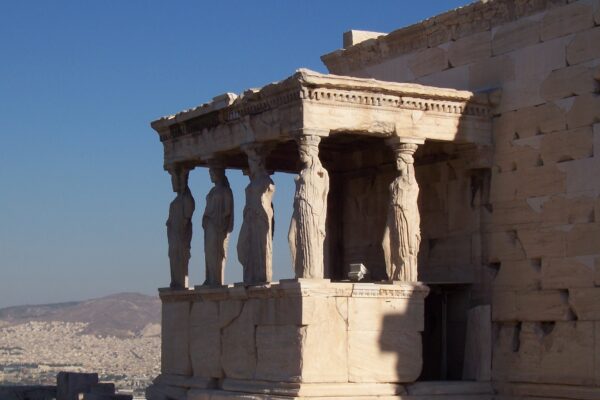
”Alexander, meet your tutor, Aristotle. Let the Contest To See Who Can Do More Harm To The World begin.”
This episode of Julius Caesar Explains brought to you by CLAS-C 102 Roman Culture, coming up next in Spring 2024, online asynchronous.
Welcome back to Julius Caesar Explains, our series where we summon Julius Caesar’s spirit from Mt. Olympus to answer our questions about Ancient Rome. Caesar, it’s good to have you with us.
DIVINE JULIUS CAESAR, FORMER ALMOST-ROMAN-EMPEROR AND ANOTHER COMPLETE SOCIOPATH: I’m still working on counter-acting this spell you use to drag me back here. And when I succeed, I’ll make it my business to haunt you to madness. You’ll go to Hades pleading for the sweet release of death, I swear it.
(Sigh). Our topic for discussion today is “Is a ‘classical education’ the best education?” There’s been growing discussion in the American political discourse about the value of a “classical education.” So to get started…can you explain to our audience what a “classical education” is?
CAESAR: No.
Please? It’s the entire topic of this episode…
CAESAR: It’s not that I don’t want to explain, although I truly don’t. But it’s really that I have no idea what they’re talking about.
We sent you a packet of materials to prep for this episode. Didn’t you read it?
CAESAR: Of course I didn’t read it. Only peasants read things themselves. I had a scribe read it to me and take notes. Neither of us could find a consensus definition of “classical education.” It’s mostly a lot of vagaries about returning to reading texts that Western cultures have found important for thousands of years. Let me tell you, as an important ancient Western author myself: If you’ve got the greatest minds in your movement and they can’t define the movement, you need either better minds or a better movement.
It sounds like proponents of a “classical education” are advocating a return to the sort of education you received. Focusing on reading Homer, Aristotle, Cato, that sort of thing. Is there a problem with returning to that framework, since it worked so well for you?
CAESAR: (disinterested shrug) I mean, the education I was given was meant to serve the social needs of an elite Roman male. So if you want to raise an elite Roman male, then yeah, I suppose you could follow the same educational path. It could be useful if you needed to slaughter the population of Gaul or start a civil war. Basic cultural-supremacist dictator stuff.
Um, I don’t think the movement wants to raise people to be cultural-supremacists or dictators.
CAESAR: Look, if you follow the recipe for a cake, I’m going to assume you’re trying to end up with cake.
Actually, a lot of literature about the “classical education” movement stresses the need to raise virtuous, thoughtful citizens. Do you think reading literature from Ancient Greece and Rome is the best way to do that?
CAESAR: I guess it would depend on what sort of virtues you are trying to instill in people. Mortals today are always going on about compassion, universal equality, concern for the unfortunate, sappy stuff. None of those ideas really had any following in the ancient world. In fact, name one famous Ancient Greek or Roman who would work well in your modern society. Go ahead. I’ll wait.
Well, there’s…um…Aristotle is popular among the “classical education” movement, particularly as an example of seeking beauty and wisdom. He seems nice enough as a model.
CAESAR: (laughing) Aristotle? He was the tutor of Alexander the Great, a guy famous for conquering the Near East, looting that territory, and then dying young in a drunken orgy. Once again, basic cultural-supremacist dictator stuff.
I think they’re thinking more of Aristotle’s influence as a philosopher and scientist. He did write a lot about scientific inquiry.
CAESAR: He also wrote a lot about how the wind direction could influence the temperature of a man’s semen, which Aristotle thought determined a child’s sex at conception, like he’d confused embryonic humans and alligators. And he was obsessed with finding eel gonads. Although for some reasons the mortals are still working on that.
Are you saying we shouldn’t study anything from Ancient Greece or Rome?
CAESAR: Don’t put words in my mouth. The last person to do that was Pompey, and his head ended up in a basket. Of course it’s important to study Ancient Greece and Rome, if for no other reason than a whole bunch of cultural-supremacist societies did and then took over a good chunk of the globe. Not understanding where those people are coming from leaves you unprepared to face a good deal of the modern world. And I’ll admit a lot of the ancient texts that are still read today address important, timeless questions, like the nature of leadership or the role of war in society. They probably just reach different conclusions about those questions than your wimpy modern minds would.
Can you give an example?
CAESAR: Let me see…a lot of modern people read The Odyssey as the prime example of man’s quest for knowledge and adventure. Yet the majority of the epic is about Odysseus living in a pigsty in Ithaca, engaging in a bum fight, trying to dupe his wife, slaughtering what remains of his subjects’ sons, and then hanging a bunch of sexual victims for the crime of being sexual victims. The story concludes with Athena basically telling everyone “Yeah, this guy is a dangerous menace to society, but he’s my bro and the king, so shove it.” I guess if there’s a moral to The Odyssey, it’s “we’re all doomed because our hero-leaders are insane,” which isn’t really the same thing as “the individual’s quest for knowledge is heroic.”
(Nervously) I don’t remember those parts of The Odyssey. I do remember his adventures against various monsters.
CAESAR: Oh, you mean the story he spins to some idiots so they won’t kill him? While he’s trying to get into their young princess’ tunic? A young princess he’s already surprised by crawling naked out of some bushes to gain her “admiration”?
(More nervously) All that sounds vaguely sociopathic.
CAESAR: (disinterested shrug)
Right. We should probably wrap up as soon as possible. So our takeaways are: An education including the societies of Ancient Greece and Rome is useful, but probably should be supplemented with a lot of additional material. But one last question that I know our audience is wondering…shouldn’t we wait to see what has stood the test of time to figure out what is worthy of study?
CAESAR: What an arbitrary standard. Are you going to wait to see what science or technology has passed the “test of time?” Because if so, don’t worry about DNA sequencing: I’ve got some exciting news about leeches and bloodletting coming up for you.
But isn’t “withstanding the test of time” how you chose what you learned for your education?
CAESAR: I didn’t learn what I learned specifically because it had “stood the test of time,” I learned it because not enough time had passed for me to read anything else. I read what we had. And on that topic, you mortals don’t even know what we Romans had. The vast majority of ancient literature of all genres has been lost. All you have is what happened to survive the vagaries of passing civilizations, and interest a bunch of medieval monks enough to have them copy it down by hand. That’s like trying to understand what someone thinks is important by going through a sample of material that their mom reposted.
Um, right, thanks…my manager is giving me a paper telling me to ask about bias within the liberal educated elite. Can’t this wait? No? Fine…Caesar, the website that hosts this series is directed by a professor at a large public university, a social group said to be hostile to socially conservative ideologies. Are you concerned that this website doesn’t reflect an informed understanding of the “classical education” movement?
CAESAR: Now here I did have my slave do some research, to figure out whether the program director is the sorceress keeping me entrapped in this conversational cycle of the damned. It turns out she’s had a lot of experience with the classical education movement.
Really? How so?
CAESAR: Well, the most famous elementary school curriculum is based on one originally developed at an elementary and high school run by this super small college in Michigan. The program director was in the opening first grade class of that school, then attended it for most of her career through her senior year in high school. She was the valedictorian of its first graduating class. She literally piloted the curriculum. Her school friends included the current head of the machine that disseminates the curriculum, and a soldier who started an all-male boarding school in the Kansas woods. She knows quite a bit about the classical education movement.
I’m sorry, did you say “an all-male boarding school in the Kansas woods”?
CAESAR: What part of that did you not understand?
Um, all of it?
CAESAR: “All-male” means no weak women allowed, which makes perfect sense from my perspective. Women would just be running around crying, seducing the soldiers, making uselessly vague predictions about murders, whatever else they do. “Boarding school” means the parents send their sons off to be raised by someone else. Admittedly I’m not sure where Kansas is, but I assume it’s in Persia somewhere. Big picture: all the young men live without women in the woods, and spend their time playing with swords and carrying heavy logs together.
Wait, what about swords and logs?
CAESAR: The sword imagery is all over the website. And according to my slave’s notes, the website specifically says: “Students reading the Iliad will carry logs over difficult terrain making the poetry a personal experience.” I have no idea what that means in the context of the Iliad, so I assume this is all some sort of weird metaphor. I have to admit, this place does remind me of my childhood. Reading a collection of ancient texts, pretending to farm, performing random physical tasks in the woods to toughen me up, instilling violent imagery and military discipline in children…
Ok, that is absolutely sociopathic. I’m leaving. Why do we keep on inviting this violent lunatic back? I don’t care that he’s in the name of the series…
Convinced you should learn about Ancient Rome? Enroll in CLAS-C 102 Roman Culture, coming up Spring 2024, and fulfill GEC requirements while you’re at it! Or for a more in-depth look, try CLAS-C 414 Art and Archaeology of the Roman World, also coming online in Spring 2024. Can’t get enough of Ancient Greece and Rome? Earn a Classics Minor in just 15 credits!


